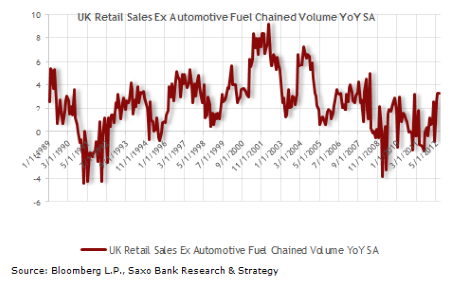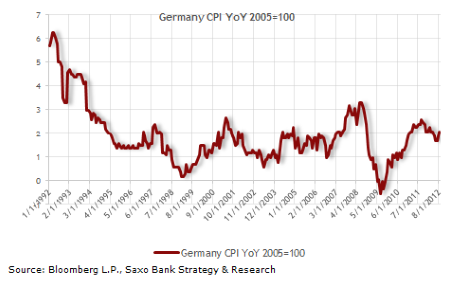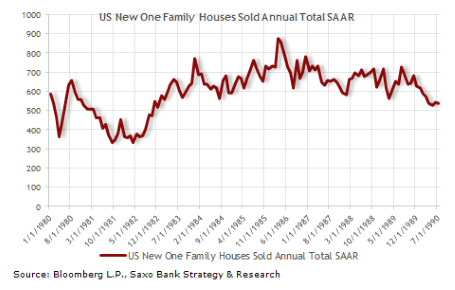Stronger-than-expected US consumer sentiment and house price data was not enough to prevent a decline in stock markets yesterday, with the S&P 500 index falling 1.1 percent. Even Apple, which recently launched its new iPhone 5, saw its shares tumble 2.5 percent. That extended its two-day decline to 3.8 percent, the most since July. A bear market in equities for this week - predicted on Monday my TradingFloor.com colleague Matt Bolduc - seems to be coming to pass. This is in spite of data from the Conference Board showed US consumer confidence index rose to 70.3 in September from 61.3 in August, its highest level since February. The S&P/Case-Shiller index also reported a 1.2 percent increase in US house prices for a composite of the country's 20 largest metropolitan cities.
Looking ahead to today, we have data on UK retail sales, German CPI and US new home sales.
Confederation of British Industry Retail Survey (10:00 GMT) The number of retailers reporting an increase in sales volumes is expected to rise on a year-on-year basis in September, compared to August's flat sales growth. During the first two weeks of August, 27% of retailers reported an increase in their volume of sales compared to a year ago, while 31% said they had seen a fall in volumes. This was in line with estimates from the Office of National Statistics, which showed retail sales contracting by 0.2% on the back of poor high street sales during the Olympics. With the games now behind us and the school season upon us here in Britain, we are expected to see a significant rebound.
German Consumer Price Index (12:00 GMT) CPI in Germany is expected to fall in September as inflationary pressures begin to ease in the Eurozone's growth engine. The year-on-year harmonised consumer price index in Germany is forecast to fall from 2.2 percent in August to 2.1 percent in September. Meanwhile, the harmonised measure of CPI is due to remain unchanged on a monthly basis. This is welcome news for the European Central Bank after inflation picked up last month, climbing above the central bank's key 2 percent Eurozone threshold. The recent bout of inflation was largely due to higher fuel and heating oil prices. 
US New Home Sales (14:00 GMT) Data on new home sales are expected to confirm that a recovery in US housing is underway, after yesterday's S&P/Case-Shiller index rose by more than expected. The number of new home sales is forecast to rise by 380,000 in August from 372,000 in July, although the rate of growth for the month, 2.2 percent, is likely to be lower than the 3.6 percent reported in July. The boost in new home sales is not entirely unexpected, given the Federal Reserve launched a programme to buy USD 40 billion of mortgage-backed securities a month until the end of the year. The question is whether the recovery in housing values, which account for a large portion of many households' net worth, will be sustained. Philadelphia Federal Reserve president Charles Plosser is skeptical it will and on Monday warned it could jeopardise the central bank’s credibility. I guess only time will tell.
- English (UK)
- English (India)
- English (Canada)
- English (Australia)
- English (South Africa)
- English (Philippines)
- English (Nigeria)
- Deutsch
- Español (España)
- Español (México)
- Français
- Italiano
- Nederlands
- Português (Portugal)
- Polski
- Português (Brasil)
- Русский
- Türkçe
- العربية
- Ελληνικά
- Svenska
- Suomi
- עברית
- 日本語
- 한국어
- 简体中文
- 繁體中文
- Bahasa Indonesia
- Bahasa Melayu
- ไทย
- Tiếng Việt
- हिंदी
UK Retail Sales, DE CPI & US New Home Sales
Published 09/26/2012, 03:19 AM
Updated 03/19/2019, 04:00 AM
UK Retail Sales, DE CPI & US New Home Sales
Latest comments
Loading next article…
Install Our App
Risk Disclosure: Trading in financial instruments and/or cryptocurrencies involves high risks including the risk of losing some, or all, of your investment amount, and may not be suitable for all investors. Prices of cryptocurrencies are extremely volatile and may be affected by external factors such as financial, regulatory or political events. Trading on margin increases the financial risks.
Before deciding to trade in financial instrument or cryptocurrencies you should be fully informed of the risks and costs associated with trading the financial markets, carefully consider your investment objectives, level of experience, and risk appetite, and seek professional advice where needed.
Fusion Media would like to remind you that the data contained in this website is not necessarily real-time nor accurate. The data and prices on the website are not necessarily provided by any market or exchange, but may be provided by market makers, and so prices may not be accurate and may differ from the actual price at any given market, meaning prices are indicative and not appropriate for trading purposes. Fusion Media and any provider of the data contained in this website will not accept liability for any loss or damage as a result of your trading, or your reliance on the information contained within this website.
It is prohibited to use, store, reproduce, display, modify, transmit or distribute the data contained in this website without the explicit prior written permission of Fusion Media and/or the data provider. All intellectual property rights are reserved by the providers and/or the exchange providing the data contained in this website.
Fusion Media may be compensated by the advertisers that appear on the website, based on your interaction with the advertisements or advertisers.
Before deciding to trade in financial instrument or cryptocurrencies you should be fully informed of the risks and costs associated with trading the financial markets, carefully consider your investment objectives, level of experience, and risk appetite, and seek professional advice where needed.
Fusion Media would like to remind you that the data contained in this website is not necessarily real-time nor accurate. The data and prices on the website are not necessarily provided by any market or exchange, but may be provided by market makers, and so prices may not be accurate and may differ from the actual price at any given market, meaning prices are indicative and not appropriate for trading purposes. Fusion Media and any provider of the data contained in this website will not accept liability for any loss or damage as a result of your trading, or your reliance on the information contained within this website.
It is prohibited to use, store, reproduce, display, modify, transmit or distribute the data contained in this website without the explicit prior written permission of Fusion Media and/or the data provider. All intellectual property rights are reserved by the providers and/or the exchange providing the data contained in this website.
Fusion Media may be compensated by the advertisers that appear on the website, based on your interaction with the advertisements or advertisers.
© 2007-2025 - Fusion Media Limited. All Rights Reserved.
